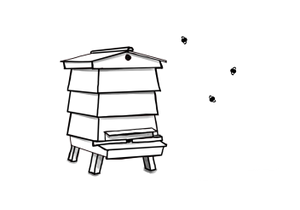You may have heard that buying and consuming local honey is better than buying and consuming supermarket honey. The reasons why, however, you may be less certain of, and it may even surprise you! That's why we have compiled a list of ways in which you can differentiate between local and supermarket honey so that you're always getting the purest and healthiest honey.
Supermarket honey is not as healthy and natural as you may think, or as the label wants you to think. In fact, in most cases, supermarket honey is not actually honey but a honey-flavoured sugar syrup that has been stripped of all its pollen (its goodness). This false sense of belief has become known by the term ‘honey laundering’.
Honey Laundering
In more detail, 'Honey Laundering' describes the process of ultrafiltration which is used to give the honey a longer shelf life. Essentially, honey laundering allows businesses to capitalise more on honey.
During the process of ultrafiltration the pollen is removed and the liquid is filled with cheap fillers like water, synthetic sweeteners. In some cases, harmful chemicals are added. By this point, the liquid is so dissimilar to honey that is impossible to determine its botanical origin.
How to tell the difference between local and supermarket honey?
Two easy and effective ways to distinguish between local and supermarket honey is by giving it a smell and checking to see if you can see any 'bits'.
Any smell?
Most supermarket honeys tends to smell the same because they are the same. In fact, the majority of supermarket honey sold in the UK is processed and bottled by the same small number of factories. In other words, the same factories are supplying the same honey to individual brands, just under slightly different labels.
Now you may be wondering what does local honey smell like? And how can I differentiate it from what is being sold on the supermarket shelves? Local honey tends to have a stronger and earthier aroma, and this will vary depending on its botanical origin.
Any 'bits'?
Another way to spot a local honey is by looking closely to see if there are any 'bits'. Mass-produced supermarket honey tends to be a clean and clear liquid, like this Gunter's bottle below.
Buy Local Honey!
You can’t really get more authentic, raw and unfiltered honey than the honey from your local beekeeper. A true honey harvester will know exactly what flowers the honey was extracted from (ours is from orange blossom!) While you may have to pay a few pounds more, at least you’ll know exactly what you’re getting and you’ll be supporting local businesses (and bees!) in the process.


